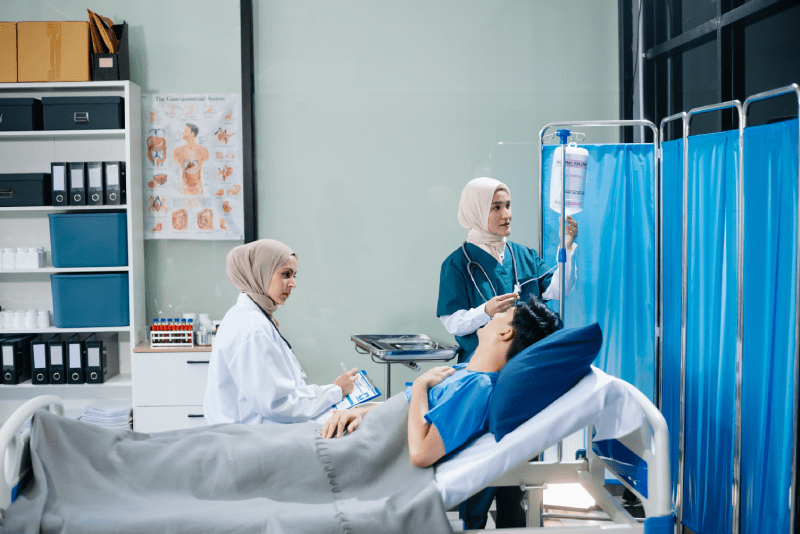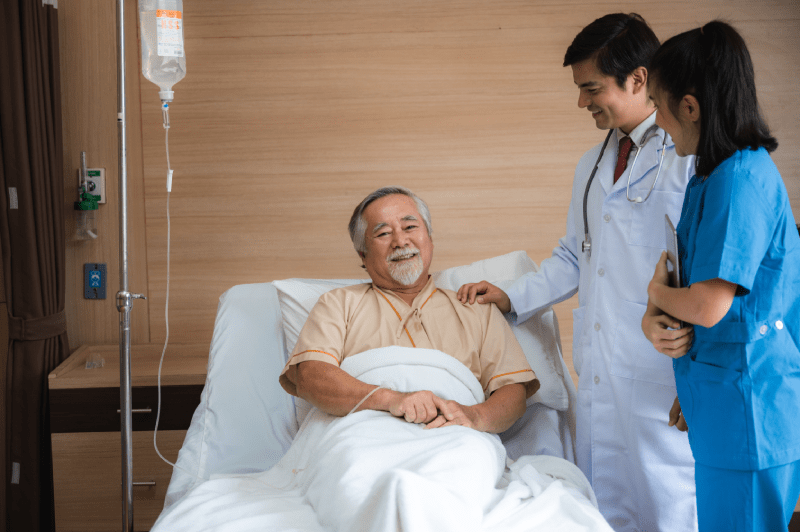What Exactly Does The Success Rate In Oncology Mean?
The success rate in oncology is generally expressed as the 5-Year Survival Rate (the percentage of patients surviving for 5 years after diagnosis). However, modern oncology success is measured by many different metrics, such as Complete Response (meaning the complete disappearance of the tumor), Partial Response (meaning the shrinkage of the tumor), and Disease Control Rate (meaning the halting of disease progression). Success is also directly related to maintaining the Patient’s Quality of Life throughout the treatment period and the management level of side effects.
Are Oncology Success Rates In Turkey At World Standards?
The success rates of leading oncology centers in Turkey are accepted to be completely on par with internationally accredited centers in Europe and America. This success is ensured by the use of modern molecular diagnostic methods, robotic surgery systems, high-precision radiotherapy devices like SBRT, and the latest smart drug/immunotherapy protocols. Success is continuously guaranteed by the regular auditing of hospitals by international accreditation organizations (e.g., JCI).
What Is The Most Important Factor Determining The Success Rate?
The most important factor determining the success rate is the Stage of Cancer at Diagnosis and the Biological Characteristics of the Tumor. Cancers diagnosed in the early stage (Stage 1) offer a chance for complete cure with surgery, while treatment for metastatic (Stage 4) cancers focuses on the goal of prolonging lifespan and improving quality of life. Furthermore, the accurate determination of the tumor’s genetic structure (mutations) and the application of appropriate Personalized Treatment (smart drugs/immunotherapy) are the most critical variables profoundly affecting success today.
How Are 5-Year Survival Rates Evaluated In Turkey?
5-year survival rates in Turkey are evaluated using data collected by national and international cancer registry systems. Major oncology centers regularly monitor these rates according to the cancer types they treat (such as breast, lung, colorectal) and compare them with international guidelines (NCCN, ESMO). For patients, these rates are presented according to the stage and subtype at diagnosis; providing an estimated prognosis specific to the individual’s disease, rather than a general rate, is a more realistic and ethical approach.
How Do Success Rates Vary According To Cancer Type?
Success rates vary greatly according to the type of cancer. For example, 5-year survival rates for early-stage breast cancer or thyroid cancer hover above 90%, while these rates are lower for aggressive types like pancreatic or small cell lung cancer. The success of centers in Turkey is internationally competitive, particularly in breast cancer surgery and oncoplastic surgery, stem cell transplantation for hematological cancers, and immunotherapy applications for lung cancer.
How Does The Multidisciplinary Approach Affect Success?
The Multidisciplinary Approach is a fundamental factor that directly increases treatment success. Successful cancer centers in Turkey routinely convene a Tumor Council consisting of a medical oncologist, surgeon, radiation oncologist, pathologist, and radiologist. This council evaluates the patient’s case file with collective intelligence, determining the most optimal combined treatment plan that is personalized and aligned with the latest global guidelines. Collective expertise, rather than the decision of a single specialist, maximizes the chance for correct diagnosis and treatment selection.
What Is The Success Of Stem Cell Transplantation In Turkey?
Turkey has high success rates and international accreditation in Stem Cell Transplantation (Allogeneic and Autologous), particularly applied in hematological cancers (leukemia, lymphoma, myeloma). Success depends on factors such as complete response to intensive chemotherapy before transplantation, donor compatibility, and Infection Control after transplantation. Centers in Turkey achieve results equivalent to international reference centers thanks to high case volumes and sterile transplantation processes.
How Do Advanced Technologies Used In Radiotherapy Contribute To Success?
Advanced technologies used in radiotherapy, such as VMAT, IMRT, SBRT, and IGRT, significantly increase treatment success. These devices enable the radiation dose to be modeled according to the tumor’s shape, minimizing harm to surrounding healthy organs (e.g., heart in lung, rectum in prostate cancer). Especially SBRT offers success rates close to surgery for early-stage tumors unsuitable for operation, broadening treatment options and preserving the patient’s quality of life.

Does The Use Of Robotic Systems In Surgical Oncology Increase Success?
The use of minimally invasive techniques in surgical oncology, such as Robotic Systems (Da Vinci) and VATS (Video-Assisted Thoracoscopic Surgery), while not increasing long-term survival rates, improves short-term success and recovery speed. Robotic surgery increases surgical precision and three-dimensional visualization, facilitating clean surgical margins, reducing blood loss, shortening hospital stay, and allowing the patient to start overall treatment (chemotherapy) faster.
What Molecular Diagnostic Tests Should A Successful Oncology Center Offer?
A successful oncology center must offer comprehensive molecular diagnostic tests to personalize treatment. These tests include determining the genetic structure of the tumor with Next-Generation Sequencing (NGS), and the accurate and rapid detection of mutations like EGFR, ALK, PD-L1 in lung cancer, and receptors like HER2, ER/PR in breast cancer. This molecular data confirms the patient’s suitability for immunotherapy or smart drugs, forming the foundation of treatment success.
What Is The Impact Of Rapid Access To Immunotherapy And Smart Drugs On Success?
Rapid access to immunotherapy and smart drugs directly affects treatment success, especially in cancer where time is critical. Centers in Turkey provide access to these innovative drugs, approved by international standards, without long bureaucratic waiting periods, allowing patients to start their treatments quickly. Starting the medication immediately prevents the progression of the disease and maximizes the effectiveness of the treatment by preserving the patient’s general condition.
How Does Getting A Second Opinion In Cancer Treatment Affect The Success Rate?
Getting a second opinion in cancer treatment, especially for complex or rare cancer types, indirectly increases the success rate by ensuring the determination of the correct diagnosis and the most appropriate treatment roadmap. An independent evaluation by a second expert team (Tumor Council) can reveal overlooked genetic mutations or recommend a more current treatment protocol. This process increases the patient’s confidence in the treatment and maximizes the chance of achieving the best outcome.
What Is The Importance Of High Case Volume In Oncology Centers In Turkey?
High case volume is one of the most important indicators of an oncology center’s experience and expertise. Centers that treat a large number of cancer cases gain richer experience even in rare cancer types or complex cases. This situation significantly increases treatment success and patient safety while reducing the risk of surgical complications, especially in high-expertise procedures like robotic surgery and stem cell transplantation.
Do Success Rates Also Include The Patient’s Quality Of Life?
Yes, success rates in modern oncology are not limited to survival times alone; the Patient’s Quality of Life (QoL) is also a critical metric measuring success. Successful centers aim to minimize treatment side effects (palliative care, pain management), and preserve the patient’s physical activity and social life. High success includes not only the patient living longer but also spending this time comfortably, actively, and symptom-free.
What Are The Success Rates In Different Stages?
Success rates in different stages are evaluated separately for each cancer type. Generally, the complete cure rate is highest in Stage 1. In Stage 2 and 3, survival rates are increased by reducing the risk of recurrence with combined treatments (surgery, chemoradiotherapy, and immunotherapy). In Stage 4 (metastatic), although the chance of cure is low, long-term responses where the disease is controlled and lifespan is significantly prolonged can be achieved with current immunotherapy and smart drugs.
What Are Turkey’s Success Rates In Childhood Cancers?
In childhood cancers (pediatric oncology), specialized centers in Turkey achieve high success rates thanks to international collaborations and protocols. Especially in frequently occurring cancers like Acute Lymphoblastic Leukemia (ALL), treatment successes are equal to those in developed countries, reaching 80-90%. This success is achieved through highly specialized pediatric oncology teams, multidisciplinary approaches, and special high-hygiene transplant units dedicated to children.
How Does The Academic Level Of The Oncology Center Affect Success?
The academic level of the oncology center plays a critical role in applying the latest knowledge and innovative treatment methods. Private centers with university hospital affiliations or academic collaborations show greater participation in international clinical trials. This allows patients access to new molecules or experimental treatments (Phase I/II studies) that shape future treatment protocols, thereby increasing the chance of success, especially in resistant or rare cancers.

How Successful Are Centers In Turkey In Metastasis Surgery?
Metastasis surgeries, such as liver metastases of colorectal cancer or lung metastases of sarcomas, are performed with high success rates in major centers in Turkey. Success depends on the ability to completely remove the metastases. In these complex operations, tumor shrinkage with pre-operative chemotherapy and post-operative follow-up are critically important. Centers in Turkey increase patients’ long-term survival by implementing current protocols in this area.
What Is The Success Rate In Cancer Types Treated With Smart Drugs?
The success rate in cancer types treated with smart drugs (e.g., EGFR-mutated lung cancer or HER2-positive breast cancer) is quite high due to the targeted effect of the drugs on the tumor. Longer and deeper responses can be achieved with fewer side effects than traditional chemotherapy. The patient’s lifespan is prolonged while their quality of life is preserved. Success depends on the patient’s regular use of the medication and the accuracy of the genetic analysis.
How Does Patient Positioning In Radiotherapy Affect Success?
Patient positioning (Set-up) in radiotherapy is the most important technical detail that affects treatment success with millimetric precision. Modern centers use Image-Guided Radiotherapy (IGRT) systems to control the position of the tumor and healthy organs in every session. Accurate positioning ensures that the radiation hits the cancer cells exactly at the target while minimizing damage to healthy tissue. This technical precision is an indispensable part of the long-term success of the treatment.
Which Cancers Do Centers in Turkey Have Special Expertise In?
Oncology centers in Turkey have special expertise, especially in Hematological Cancers (Stem Cell Transplantation), Head and Neck Cancers (radiotherapy), Breast Cancer (oncoplastic surgery), and Lung Cancer (immunotherapy and robotic surgery). Thanks to high case volumes, international collaborations, and the use of advanced technology in these areas, Turkish centers achieve successful results in these cancer types, attracting international patients.
How Can Accurate Information About Success Rates In Turkey Be Obtained?
To obtain accurate information about success rates in Turkey, data from the Cancer Registry Systems of internationally accredited hospitals and annually published Clinical Outcome Reports should be examined. Instead of general promotional materials, requesting scientific data published by the relevant centers, separated by cancer type and stage, is the most reliable way. Health tourism consultants like Cure Holiday guide patients to centers with this transparent and verified data.
What Is The Role Of Nutrition And Psychological Support Affecting Success?
Nutrition and psychological support affecting success are the invisible but vital components of the treatment. Cancer and its treatment often cause loss of appetite, fatigue, and anxiety. In a successful center, a team consisting of an oncologist, dietitian, and psycho-oncologist aims to preserve the patient’s muscle mass, strengthen the immune system, and maintain psychological strength. High morale and a strong immune system support the patient’s compliance with treatment and indirectly increase the survival rate.
How Is Success Measured In Metastatic Cancers (Stage 4)?
Success in metastatic cancers is generally measured by the Disease Control Rate and Progression-Free Survival (PFS). The primary goal of treatment at this stage is to control the disease for a long time, rather than completely eradicating it, and to preserve the patient’s quality of life. Success is evaluated by the degree of tumor shrinkage and the duration the growth/spread is halted, thanks to smart drugs or immunotherapy.
Which Technologies Directly Affect Diagnostic Success?
Technologies that directly affect diagnostic success include PET-CT, High-Resolution Magnetic Resonance (MR), and Liquid Biopsy. PET-CT shows cancer foci in the body based on metabolic activity, finalizing the staging. Liquid biopsy, in cases where tissue samples cannot be obtained or resistance is suspected, rapidly detects genetic mutations from a blood sample, increasing the speed and accuracy of the diagnosis and treatment decision.
Does Success Depend Only On Clinical Factors, Or Does Treatment Compliance Also Affect It?
Yes, success is directly affected not only by clinical and technological factors but also by the patient’s Compliance and Discipline with Treatment. Timely attendance at chemotherapy/radiotherapy sessions, regular use of smart drugs, adherence to nutrition rules, and quitting smoking are fundamental patient responsibilities that maximize treatment effectiveness. Successful centers offer comprehensive education and support programs to enhance patient compliance.
How Do International Patients’ Treatment Processes Affect Success?
International patients’ treatment processes positively affect success due to the advantage of fast diagnosis and treatment initiation. Since there are no long waiting lists in Turkey, the patient can start treatment immediately after the diagnosis is confirmed. This speed prevents the cancer from progressing. Furthermore, comfortable accommodation, translation, and logistical support services reduce the patient’s stress, allowing them to focus on treatment and supporting the overall recovery process.
How Is The Current Protocol Usage Status Of Oncology Centers Monitored?
The current protocol usage status of oncology centers is monitored by how well doctors adhere to the guidelines set by international oncology societies (ASCO, ESMO). Successful centers regularly audit their protocol compliance rates and share their results. This guarantees that patients in Turkey always receive the newest and scientifically proven treatment methods.
How Is Recurrence Follow-Up Done In A Successful Center And What Is Its Importance?
Recurrence follow-up in a successful center is performed intensively and meticulously for the first 5 years after the patient completes treatment. Generally, CT/MRI scans, blood tests, and physical examinations are done every 3-6 months during the first two years. This strict follow-up ensures that a potential recurrence is caught at a very early stage (as a small tumor). Early recurrence detection directly increases the success of salvage treatment and the patient’s long-term survival chance.

How Is Turkey’s Success Rate Ensured In Rare Cancer Types?
Turkey’s success rate in rare cancer types is ensured by the existence of specialized reference centers and broad molecular test panels. Physicians specialized in rare cancers and centers with high case experience better understand the complex biology of these cancers. Advanced genetic analyses like NGS detect rare mutations, enabling the application of international drug protocols specific to these cancers.
How Does Complication Management During The Treatment Process Affect Success?
Complication management during the treatment process affects success indirectly but vitally. The rapid, correct, and effective management of complications such as infection, bleeding, and organ toxicity that may occur after intensive chemotherapy or surgery prevents the patient from interrupting treatment and preserves the chance of survival. Successful centers have experienced intensive care and emergency teams ready 24 hours a day for such complications.
What Is The Difference Between Centers With High Success Rates?
The difference between centers with high success rates is the presence of highly specialized multidisciplinary teams who not only have technological devices but also use these devices optimally. These centers focus on patient safety, personalized treatment, and the meticulous application of current protocols. Furthermore, they provide holistic support (psycho-social and nutrition) to the patient, ensuring that treatment aims to heal not only the disease but the whole person.
What Is The Response Rate To Immunotherapy in Lung Cancer?
The response rate to immunotherapy in lung cancer varies according to the tumor’s PD-L1 expression and cancer type. In metastatic NSCLC (Non-Small Cell Lung Cancer) patients with high PD-L1 levels, response rates over 40-50% can be seen with immunotherapy alone. In low PD-L1 levels, the chance of success is increased by combining immunotherapy with chemotherapy. These high response rates indicate the revolutionary place of immunotherapy in treatment.
How Are Misleading Information About Oncology Successes In Turkey Avoided?
To avoid misleading information about oncology successes in Turkey, patients should not focus on general, raw statistics. When evaluating treatment success, attention should be paid not only to the 5-year survival rate but also to the center’s case volume, international accreditation (JCI), and the currency of the treatment options offered specifically for the patient’s cancer type. Requesting transparent clinical outcome reports from hospitals through a health tourism consultant is the most reliable way.
What Precautions Should The Patient Take At Home For Treatment Success?
The most important precautions the patient should take at home for treatment success are maintaining lifestyle discipline. This includes absolutely quitting smoking, continuing regular physical activity approved by the doctor, paying attention to a high-protein and balanced diet to protect body resistance, and maintaining a healthy weight. Additionally, regular use of medications, timely attendance at all appointments, and seeking support to maintain psychological health are fundamental steps supporting success.
How Does The Speed Of The Oncology Center To New Treatment Protocols Affect Success?
The speed of the oncology center in adapting to new treatment protocols (e.g., new smart drug combinations or updated radiotherapy doses) directly and positively affects success. Since cancer research constantly advances, the faster a center adopts current protocols, the sooner it can offer its patients the latest scientifically proven treatment. This agility prevents the patient from losing time with older, potentially less effective methods.
How To Start Successful Oncology Treatment In Turkey?
The first step to start successful oncology treatment in Turkey is to gather all your current medical reports (biopsy, PET-CT, molecular tests). Next, contact a professional health tourism consultant like Cure Holiday who works with internationally accredited oncology centers and organizes your entire process. Cure Holiday submits your reports to the oncology council specialized in the most relevant field, quickly communicates your personalized treatment plan, cost, and appointment schedule, enabling you to start a comfortable and reliable treatment journey.
Turkey’s oncology centers have internationally competitive success rates thanks to their technological superiority and expert physician staff. Making the right decision and achieving the best outcomes in your treatment journey depends on choosing a center focused on personalized treatment and a holistic approach.
To quickly create your personalized treatment plan, gain access to advanced technology oncology centers in Turkey, and receive comfortable health tourism support throughout the entire process, you can contact Cure Holiday.



